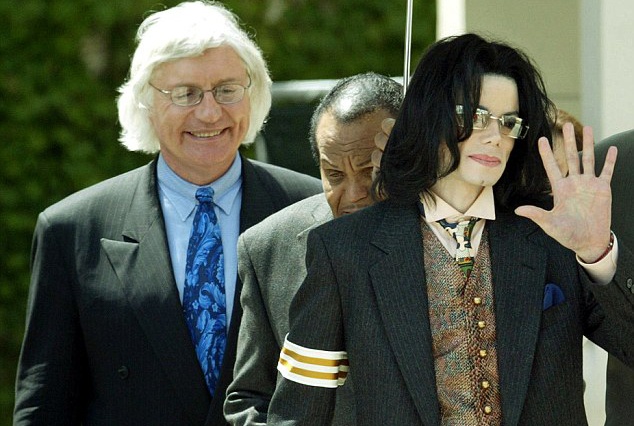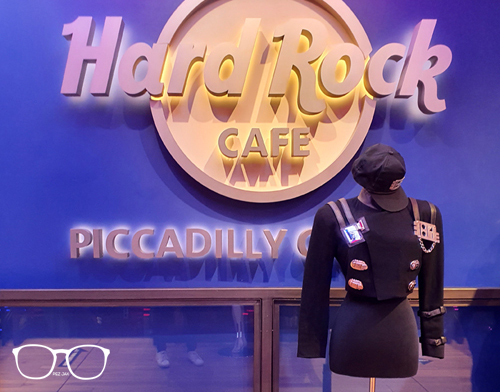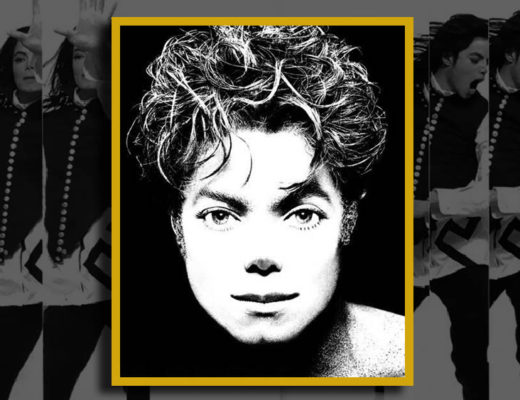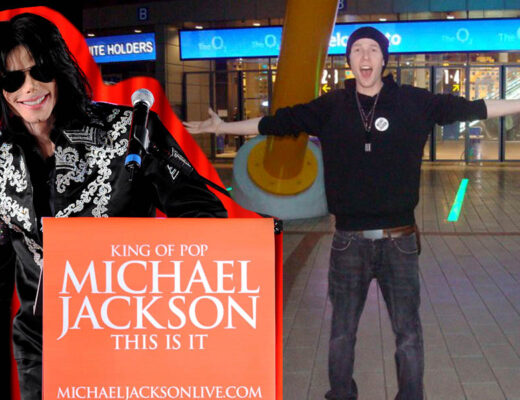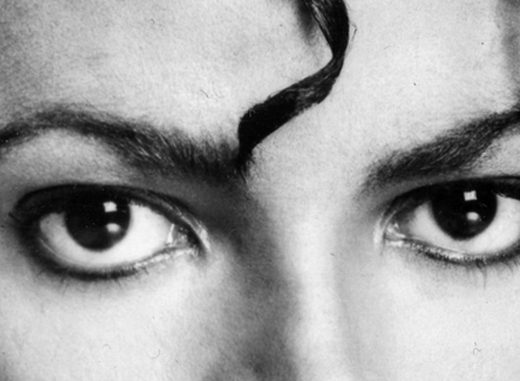In 2012, I had the chance to interview attorney Tom Mesereau. I wanted to discuss the 2005 Michael Jackson trial. However, instead of discussing specifics of the case, I wanted to understand more about what was happening around Michael Jackson at the time, how the case was impacting him and how Mesereau handled some of the more absurd claims in the case.
To mark the 16th anniversary of the verdict, I decided to revisit the interview and share this unique insight from the man who came to Jackson’s rescue and has remained fighting his corner, ever since.
Firstly, thank you so much for what you did for Michael during the trial. It is an honour to be able to thank you in person. We all felt you were the one person who could make it for Michael so thank you for all your efforts and for everything you did. It meant a lot to the fans.
Michael was a wonderful person, very kind, very descent, very spiritual, a musical genius behind comparison and thank you for your interest and your compliment.
How did you become a law professional?
My father was a graduate of the United States Military Academy in West Point and he took a lot of classes in college and although he was not an attorney, he always suggested that if I wasn’t sure what I wanted to do with my life, I should go to law school. He felt education was very valuable and provided many opportunities to do different things: whatever it is politics, business, the law, specialist within the law. He always urged me to consider it. At one point I thought about being a journalist and I actually did a Master degree in NLC in London, and starting law school the next year, actually every couple of months I just didn’t want to be in school so I spoke to the Dean and we agreed I will take a year’s leave and I explored the options in foreign correspondence work and journalism during that year and I eventually decided I wanted to go back to law school and that is what happened.
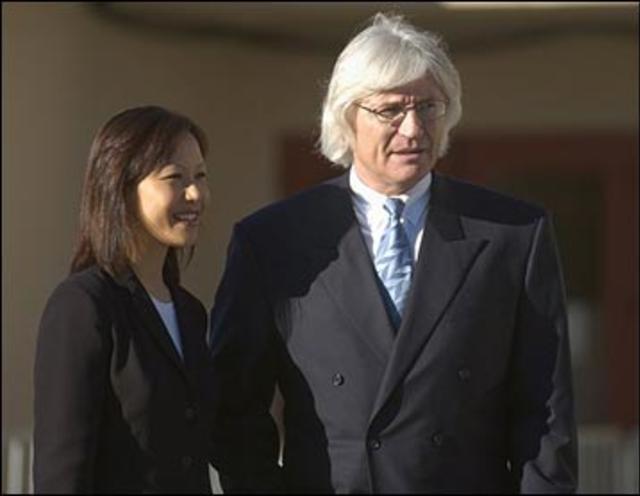
After you graduated and began working in the field, you went on to meet the lovely Susan Yu. How did you meet her?
I was subletting space in another building from her law firm, she was with a civil obligation firm, and we became friends and at one point we decided to open our own practice together.
After you opened the practice and working on many cases over the years, you were contacted by the Jackson family. How did they first get in contact with you regarding Michael’s case?
I was defended a high-profile homicide in Los Angeles, I was defending actor Robert Blake who was accused murdering his wife and at the time; this was before September 11th, it was the highest case in the United States, and I was hired to defend him with Susan Yu as my co-counsel. While I was defending him, Neverland Ranch was raided in November 2003. I was preparing for the Robert Blake murder trial in February 2004, I had taken 10 days off. I turned off my cell phone and got away from it all. While I was driving home, I turned on my phone and within a minute it was ringing nonstop. People around Michael Jackson in Las Vegas where he was at the time, were desperately asking me to fly out to meet him and they told me that he wanted me to defend him. I told them that I could not serve two masters at once. It would be very unethical for me to take on his case when I was doing the Robert Blake case four months later.
They were stunned that I would not grab what they felt it was the biggest opportunity in my career. I said “if Michael Jackson’s charged which it looks like he will be, it is going to be a far bigger case than the Robert Blake case but I don’t make decisions like that and I am currently obligated to my current client and I don’t see how I can effectively do both at once.” I have known Randy Jackson for many years, and I’ve never met Michael. The calls kept coming all day and I kept saying that I was very flattered, I would love to do it but it will not be, in my opinion, professionally and ethically who I am if I jumped to a higher profile case while I am obligated to another case four months later. I was in the middle of picking a jury in the Robert Blake case and he and I had major falling out which will remain confidential. The judge in the case tried to resolve it and she spent 45 minutes to an hour with us, but we couldn’t resolve it. So, I ended up redrawing from the case.
In a very short of time, Randy Jackson called and said: “Look, we’ve always wanted you, Are you know available?” I said I was and one thing led to another, I ended up taking a secret trip to Florida to meet Michael for the first time and undergo some questioning and I flew back – all very secretly. Within a short period of time Randy called me to tell me that they wanted me to defend him and I asked “have you been talking to other lawyers” and he said “No, after your interview with Michael, he said he didn’t want anybody else”. That’s how I ended up defending Michael.
Of course, I told all of them that the only lawyer I insisted to be part of the team was Susan Yu, she is just a brilliant, creative lawyer who brings a beautiful perspective to understand evidence and strategy and she is the only one I insisted who has to be in court with and Randy and Michael, both knew about her and wanted her too. There were some other lawyers who had been with the team, they of course wanted to get rid of Mark Geragos and Ben Brafman and some of those other lawyers remained but as far as I was concerned, as far as Randy and Michael were concerned, Tom Mesereau and Susan Yu were the prime lawyers in his defense and that’s how it all began.
That was a very wise choice of his. Prior to your appointment as Michael’s lawyer and meeting him, what was your personal feeling on the case and what was going on around him?
I am very skeptical of what the media says in general. I did follow in distance the Chandler case in 1993 and I certainly was a great admirer of the late Johnnie Cochran who represented Michael Jackson in that chapter. When I read about that, I was really suspicious for a lot of reasons. Clearly the media was feeding at Michael Jackson’s expense and salivated over this shocking story. But it did not sit well with me that a father, whose son was ‘molested’, would forgo a criminal investigation and just ask for money. It never made sense to me. And again, I was not directly involved.
So, I was well aware of that situation then Johnnie Cochran went to defend OJ Simpsons and of course I followed that case very closely. While I was defending Robert Blake, Johnnie Cochran and I both received awards as criminal defense lawyers in Los Angeles, and he was someone who I really saw as a role model and a hero. I later found out that he recommended Michael and Randy hire me as a defense lawyer. But I was just skeptical of this huge media frenzy that was beginning to swell around Michael Jackson. I’ve seen enough of the media to know what it does to people and how people become intoxicated with it, they’re becoming famous and wealthy; and that was the greatest celebrity in the world who was the biggest target in the world. My feeling was it was a bourgeoning, swelling, enlarging story that the media was creating – but I was very skeptical.
With everything that happened to Michael, it was hard for Michael to trust people. How did you work on gaining his trust and confidence?
The first thing I had to do is to learn about the evidence and learn about the client. I didn’t know Michael Jackson. I didn’t know the evidence. The media were already convicting him before I had a chance to look at anything. I was very unimpressed by what his prior lawyers were doing. They seemed to be so excited to be on the case and enjoying the media so much that I didn’t think they were helping the situation. So, I approached it in a very neutral state of mind. I wanted to learn what I could about the client: what they tried to do, who is this person, what does he like, where does he come from, what influences his personality, and his development and his life; I wanted to see objectively what the prosecution thought they had and come to my own conclusion. Of course, I had meetings with Michael Jackson, spoke to him in depth about his life, the situation and about whom his accusers were and it didn’t take me very long to just conclude that he was not capable to do this kind of thing. I mean the motion that Michael Jackson would, first of all, molest children and harmed a child who was cancer stricken and maliciously give alcohol to numb that child to perform perverse act – it made no sense to me! He didn’t seem to be the kind of person to even capable of imagining that kind of behavior. If you add to that they were accusing him of masterminding a criminal conspiracy to falsely imprison a family, abduct children and commit criminal extortion, again it seems so absurd and it seems so unlike anything he was capable imagining.
Then of course we started to gather information on his accusers, and I began to realise that particular family had tried something similar with JC Penney Store, they had history of approaching celebrities like George Lopez and Chris Tucker to get money, there was so much questionable about them. Then I began to learn more about the Chandler case in 1993 and how suspicious that all looked. The prosecution put forward evidence that other young men have been molested like Macaulay Culkin and Wade Robson and we began to approach them and obviously they said nothing like that ever happened; they were shocked of these allegations, and they were under tremendous pressure not to participate in the trial because the media gave a worldwide impression that he had no chance to win this trial, prison was a foregone conclusion. Then I found out that Chandler wanted nothing to do with the trial and he has apparently fled to Europe beyond reach of any suggestion by the prosecution or the sheriff that he should testify. I began to look at the other accuser who said nothing happened and then changed the story numerous times, then he and his mother wanted a large amount of money, then his mother wanted to sell his story to the tabloids, I began to look at a number of law suits against Michael Jackson by Neverland employees and others and I had to step back and realise that the world of Michael Jackson was unlike any other world and he was perceived so vulnerable, so childlike, so creative and someone who didn’t want to step in court room, who didn’t want to go through days and weeks with lawyers and depositions, cross examination and things of that sort; and suddenly it starts to come together that was a scam, this was a fraud and the prosecution, the police and the sheriff were blinded by their own desire for fame; they were just seeing what they wanted to see and ignoring the other side of things. I came to a conclusion that this man was completely innocent, he wasn’t capable of committing these kinds of alleged crimes and we had to prove ourselves in court.
One thing you mention was the Chandlers and something I always wanted to have the answer to is, originally, they agreed to take a settlement as opposed to going to trial, how was it they were allowed to testify in this case?
First of all, as part of a civil settlement in the United States, you cannot agree to not testify in a criminal proceeding; that would be against public policy and enforceable so you cannot pay money to someone and have them formally agree that they will not show up in a parallel criminal case or they will not cooperate with the government or investigation. That is something you cannot do in America. So, there was a civil settlement, I looked deeply into it. I got the impression that Michael has been advised by various people to pay the money and end that chapter. Of course, the people who advised him to do it were not writing the cheque, he was. My impression was that they told him that this publicity is hurting his career and that sum of money is minuscule compared to what he can earn, and he became convinced that was the best way to go even if he was very reluctant to do it. So it seems to me Michael was pressured in so many different ways, by many different people to end that chapter, write the cheque and get rid of the whole thing. He regretted doing that as I am sure you all know, and I made a statement before his criminal trial that was a big mistake to have made that settlement and it has just opened Pandora’s Box and got other people think “Why work if you can sue Michael Jackson?” and I think that was the primary motivation behind this new trial.
Absolutely! Take a significant day that the media seems to love which they called “Pajama Day”, which now I think Michael was a trend setter because Rihanna walked on the Red Carpet in pajamas just last week! Do you think the judge was unreasonable giving the situation on the day that Michael actually fell in the shower? To request Michael to come to court from the hospital?
Well, I would have preferred he’d give him more flexibility but giving the situation, I understand the judge’s concerns, you have to step back and, first of all, look at the OJ Simpsons case which took place in Los Angeles a number of years before. The judge in that case who had a very strong reputation as being an excellent jurist, had his career ruined because the perception was he let the case getting out of control, that he did not put his foot down as often as he should have and dealing with the prosecution and the defense attorneys, that should have been a shorter trial and ended up being nine months and after that trial, no judge in Los Angeles allowed a camera in a court room until a few years ago. So here’s a little judge in Santa Maria whose was probably a bit traumatized by what he saw happened to the judge in the OJ Simpson’s case, whose now handling a case which was much bigger that the OJ Simpson’s one, that had more media coverage in America’s history because of who Michael Jackson was and he knows that has the potential to get out of control, to look like a circus, and to really ruined his career and I think he probably saw Michael on the top of the SUV which was before I was on the case, he probably felt that something would happen which would test his medal, and when I found out what happened to Michael, I went to him and wanted him to speak to the physicians at the hospital and he refused to and put his foot down and said “If he is not here in a certain amount of time, I am going to forfeit his bail and put him in jail for the rest of trial.” and I was horrified by that so I was the one who told Michael and his staff: “He has no time to go home, he has no time to get changed, he must get to court right now!” And that’s what happened.
Do you think a televised court case would have benefit Michael knowing how the media were against him?
Theoretically it could have because I don’t think the media were reporting the cross examination of the witnesses. I noticed some reporters disturbing testimony by running out of the court room and avoiding the cross examinations. Clearly a camera in the court room would show more dramatically the other side. However, I would not change anything because we won on every single charge. And he was completely vindicated in my opinion so looking back I would not change anything! We won!
Absolutely! How was the decision made that Michael would not take the stand?
That’s the decision that you always reserve making until the last second. You want to see how the trial is going, how you perceive the jury is reacting and that decision is always made at the last minute. Michael wanted to testify and give his side of the story. However, I felt, as he already testified in a video in the Bashir documentary and the outtakes that were not included in the Bashir Documentary, he had said all he needed to say. And also, remember he was physically and emotionally devastated by this experience. He was exhausted; he was not sleeping well, eating well. I was talking to him at 3 or 4 in the morning. He would call Susan Yu at 3 or 4 in the morning to talk about things and he was not in a great position emotionally or physically. However, I would have put him on if he wanted to testify if I thought it was necessary, but I felt on that stage, we were winning the trial, he addressed every issue that needed to be addressed in that video tape testimony and it was not necessary.
When the trial finished, the world wanted to hear from Michael, to hear his side of things. Do you know why the decision was made for Michael to stay completely silent?
Michael and his family left the courthouse, victorious! And went right to Neverland. Susan Yu and I did not give a press conference even though a lot of journalists around the world wanted us to, but we felt that our place was with Michael and his family at Neverland. So, we went there as well. Michael and his family were very relieved, very grateful, and there was no sense of ecstatic jubilation. There was a sense of gratitude. That was really up to Michael what he wanted to do. He had to heal physically and emotionally, he looked just awful on verdict day, I am sure you remember it. His cheeks were sunken in, he looked as though he hadn’t slept for weeks, he had trouble eating. Unfortunately, he will go home after a day in court and everyone in Neverland would have watched the coverage on TV which was very directed to a result which would give them more revenue instead of fairness, so he will go home to this disturbing discussion about what the media were saying and what was going on in the court room and he had to be troubled by that. Susan and I were encouraging him that the case was going well, we couldn’t guarantee what the jury would do but it was going well and hopeful he would be acquitted on all accounts. However, when you are in the middle of a media environment like that and you are very distrustful of the system in general…for you to be in that position, so I think he was terrified of what would happen to his children, to him. He had to heal from all this. I’ve never said to him “Why have you not made a statement yet?” but I think I know why.
After the trial, Michael left Neverland and decided to head around the world. Was it on your instructions or on his own choice?
Ultimately it was his choice, but it was my recommendation, my very strong recommendation. Remember Santa Barbara County is north of Los Angeles County where I practice and I’ve never try a case in Santa Barbara County. Santa Maria is a very conservative blue collar working-class County. It is a place with very nice people, beautiful landscapes. This is the place where Michael decided to live; he loved to spend time there; he created Neverland. However, I lived there during the trial and I had a very good feel for his prosecutors and Sheriffs and my feeling was they were devastated by the defeat, they felt humiliated in front of the whole world; When Susan & I met them for the first time, they were walking on air, they were on the top of the world, they felt they were going to win the biggest case in history. After it, I just had a feeling they were so embarrassed by the loss that they would do anything to get to Michael Jackson. I felt he would never live in peace there ever again. I’ll tell you the exact words I used: “Michael, this is a white boy’s network. They’ve been humiliated. They never had the government looking over their shoulders when it came to race relation like in the Southern states, and these guys run the show and they will never leave you in peace. Neverland’s time has passed, and you need to move on to something new. Open a better chapter of your life”. It was my strong recommendation and I had calls from people around him who were upset with the recommendation. They asked me if I had specific information about something which is going to happen. I said I didn’t need it; I just knew and experienced what I have seen and that is not a place for him to live again.
Did he ever express his feelings about America?
Well, after I made that recommendation, the next time I heard from him, he was calling Susan Yu from the Middle East and everyday Michael would call Susan from Bahrain for assistance in the transition. I never raised that subject with him again to be honest with you. I certainly heard just like you how unhappy he was with America, our justice system, and the way he has been treated. Who can blame him of course? But I’d never directly addressed this with him.
Ok! One thing I want to touch on, one of the most ridiculous claim from the whole trial other than the molestation accusation that was the claim of abduction. This is so ridiculous that it is laughable. How could the prosecution claims that Michael was co-conspirator and yet the others never been to court?
There was a serious strategic reason for them doing that. First of all, we have a concept in American law called “Hear Say Evidence” which is an out of court statement made by someone who is not in court to be examined. In another words, if somebody says something in Neverland, in theory you can bring that into court except if that person is set to be cross examined. Hear Say evidence is a person who is not in court to be questioned and tested. There is an exception to this in a conspiracy case which is called the co-conspirator hear say exception. If an allegation of conspiracy is made, someone is allowed to come in and testify to what an alleged co-conspirator said; even though the co-conspirators are not in the court room to be questioned or tested regarding this allegation. So by bringing the conspiracy charge, you allow these people to testify to what others co-conspirators said or did outside the court room.
Number two: By bringing the conspiracy charge and claiming that all these other individuals are co-conspirators, you are able to scare them away. Once they find out there is a chance, they can be charged with criminal conspiracy which is a very serious felony charge which can lead to prison time, they all hired lawyers and their lawyers told them to not get involved and upset the prosecution, don’t help the defense, save your own skin. So, what we are left with are these people testifying about what these people said or did. Anytime, they thought somebody was going to help Michael Jackson; they filed a document calling them co-conspirator to scare them away.
The third reason was they wanted to make Michael Jackson look like a monster. And along with the other claim, molestation, attempt of molestation, giving alcohol to a minor in attempt of molestation, they wanted to make him look like a mastermind criminal who had no problem abducting a family, threatening a family; they thought that this extra charges will make him more convictable, would allow them to devalue him more in front of a jury. Remember this is a very conservative community where the conviction rate is very high. That was the 3 main reasons I think they brought these charges and obviously they backfired!
This is just absurd from what you have just said, it just seems completely unimaginable and I don’t know who thought of that idea!
In the sense, they probably helped us! Because the charges were so absurd.
Moving on from the trial how was your relationship with Michael?
When Michael moved to the Middle East, I talked to him a couple of times but I was not in communication that much. There was a period of nine month where Susan Yu was talking to Michael and Grace; I sort of helped Susan time to time with her activities and she was helping him with the transition, everything from dealing with lawyers in the Middle East, Entertainment lawyers and executives, selling animals at Neverland, you name it. She was spending a lot of time, more than I was. So, I didn’t really talk to him that much except once in a while; and usually the concerns were business related. I was not really part of his life in a personal sense after the trial. I had the feeling that I had done the job I was there to do. I told him the first time I met him “Michael, I know you are not used to hearing this but I am not here to get into your Entertainment Empire and financial empire! I am here to win a criminal case!” I kept that that attitude and I tried to help where I could but I kind if moved on.
When you talk about the trial, you seem very passionate about the work you did especially for Michael. Why is that? Did you form a connection with him?
Yes I think I did! This was his darkest hour. I met him probably at the worst chapter of his life where he was just terrified, deteriorating physically and emotionally and just scared to death to lose his children. He couldn’t believe he was in this situation. I saw him as a very vulnerable, creative spirit with a wonderful heart, with a very generous humanitarian way about him, with a desire to change the world in a positive way and the idea he will be through in this legal dungeon by the American criminal system is just disgusting. So I got to see who he was, feel who he was and realise how unjust the whole process was, I developed a very passionate loyalty there and I didn’t let it interfere with my objectivity; you have to step back objectively and periodically to see how a case is going, how things look legally and factually but nevertheless I did develop a passionate feeling about him and a passionate dislike for these charges and for the prosecution was trying to do.
How did you feel after hearing Michael passed away?
Well, I was just in shock! My first reaction was denial because through the years I’d heard so much false rumors about Michael Jackson. But my first thought was that I hoped it was another media absurdity! I was in the middle of a trial in Los Angeles with Susan and we were walking out of the room and Randy Jackson’s girlfriend at the time who was assisting us with a computer aspect of our case said Michael had died and I didn’t know if I wanted to believe her or not. I went to the courthouse and 2 sheriffs came up to me and told me the same. I called my office, and my message machine was full, people from all over the world trying to get my impression about it. I was so shocked and devastated and I didn’t want to believe it.
****We spoke about the Conrad Murray case, but I’ve chosen to remove that section for this published version of the interview****
We will finish the interview on a positive note. If you had the opportunity to give Michael a piece of advice today, what will it be?
… the advice I would have to give him would be to be very careful of people around you, you are too trusting! You are too giving! You are too vulnerable to people who come to you and said they will solve your difficulties; they will handle your business for you to be more creative! You must be more careful of who you trust!
This Interview is not to replicated or translated in whole or in part without permission.

